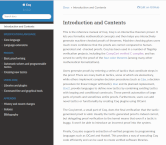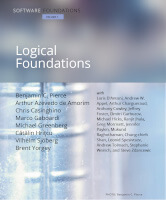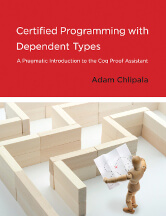Last Updated on September 19, 2025
Coq is a dependently typed language. This means that the types of the language may depend on the values of variables. In this respect, it is similar to other related languages such as Agda, Idris, F*, Lean, and others. Via the Curry-Howard correspondence, programs, properties and proofs are formalized in the same language.
Coq is developed in OCaml and shares some syntactic and conceptual similarity with it. Coq is a language containing many fascinating but difficult topics.
Here’s our recommended free books to learn Coq.
1. Reference Manual by the Coq development team
 This is the reference manual of Coq. Coq is an interactive theorem prover. It lets you formalize mathematical concepts and then helps you interactively generate machine-checked proofs of theorems.
This is the reference manual of Coq. Coq is an interactive theorem prover. It lets you formalize mathematical concepts and then helps you interactively generate machine-checked proofs of theorems.
Machine checking gives users much more confidence that the proofs are correct compared to human-generated and -checked proofs.
2. Software Foundations by Various Authors
 The Software Foundations series is a broad introduction to the mathematical underpinnings of reliable software.
The Software Foundations series is a broad introduction to the mathematical underpinnings of reliable software.
The principal novelty of the series is that every detail is one hundred percent formalized and machine-checked: the entire text of each volume, including the exercises, is literally a “proof script” for the Coq proof assistant.
The exposition is intended for a broad range of readers, from advanced undergraduates to PhD students and researchers. No specific background in logic or programming languages is assumed, though a degree of mathematical maturity is helpful. A one-semester course can expect to cover Logical Foundations plus most of Programming Language Foundations or Verified Functional Algorithms, or selections from both.
There are 4 volumes:
- Volume 1 – Logical Foundations is the entry-point to the series. It covers functional programming, basic concepts of logic, computer-assisted theorem proving, and Coq.
- Volume 2 – Programming Language Foundations surveys the theory of programming languages, including operational semantics, Hoare logic, and static type systems.
- Volume 3 – Verified Functional Algorithms shows how a variety of fundamental data structures can be specified and mechanically verified.
- Volume 4 – QuickChick: Property-Based Testing in Coq introduces tools for combining randomized property-based testing with formal specification and proof in the Coq ecosystem.
3. Certified Programming with Dependent Types: A Pragmatic Introduction to the Coq Proof Assistant by Adam Chlipala

This book is about certified programming using Coq.
This concept of certification, a standard one in the programming languages and formal methods communities, has to do with the idea of a certificate, or formal mathematical artifact proving that a program meets its specification.
This book is licensed under a Creative Commons Attribution-Noncommercial-NoDerivative Works 3.0 Unported License.
Next page: Page 2 – Mathematical Components and more books
Pages in this article:
Page 1 – Reference Manual
Page 2 – Mathematical Components and more books
All books in this series:
| Free Programming Books | |
|---|---|
| Ada | ALGOL-like programming language, extended from Pascal and other languages |
| Agda | Dependently typed functional language based on intuitionistic Type Theory |
| Arduino | Inexpensive, flexible, open source microcontroller platform |
| Assembly | As close to writing machine code without writing in pure hexadecimal |
| Awk | Versatile language designed for pattern scanning and processing language |
| Bash | Shell and command language; popular both as a shell and a scripting language |
| BASIC | Beginner’s All-purpose Symbolic Instruction Code |
| C | General-purpose, procedural, portable, high-level language |
| C++ | General-purpose, portable, free-form, multi-paradigm language |
| C# | Combines the power and flexibility of C++ with the simplicity of Visual Basic |
| Clojure | Dialect of the Lisp programming language |
| ClojureScript | Compiler for Clojure that targets JavaScript |
| COBOL | Common Business-Oriented Language |
| CoffeeScript | Transcompiles into JavaScript inspired by Ruby, Python and Haskell |
| Coq | Dependently typed language similar to Agda, Idris, F* and others |
| Crystal | General-purpose, concurrent, multi-paradigm, object-oriented language |
| CSS | CSS (Cascading Style Sheets) specifies a web page’s appearance |
| D | General-purpose systems programming language with a C-like syntax |
| Dart | Client-optimized language for fast apps on multiple platforms |
| Dylan | Multi-paradigm language supporting functional and object-oriented coding |
| ECMAScript | Best known as the language embedded in web browsers |
| Eiffel | Object-oriented language designed by Bertrand Meyer |
| Elixir | Relatively new functional language running on the Erlang virtual machine |
| Erlang | General-purpose, concurrent, declarative, functional language |
| F# | Uses functional, imperative, and object-oriented programming methods |
| Factor | Dynamic stack-based programming language |
| Forth | Imperative stack-based programming language |
| Fortran | The first high-level language, using the first compiler |
| Go | Compiled, statically typed programming language |
| Groovy | Powerful, optionally typed and dynamic language |
| Haskell | Standardized, general-purpose, polymorphically, statically typed language |
| HTML | HyperText Markup Language |
| Icon | Wide variety of features for processing and presenting symbolic data |
| J | Array programming language based primarily on APL |
| Java | General-purpose, concurrent, class-based, object-oriented, high-level language |
| JavaScript | Interpreted, prototype-based, scripting language |
| Julia | High-level, high-performance language for technical computing |
| Kotlin | More modern version of Java |
| LabVIEW | Designed to enable domain experts to build power systems quickly |
| LaTeX | Professional document preparation system and document markup language |
| Lisp | Unique features - excellent to study programming constructs |
| Logo | Dialect of Lisp that features interactivity, modularity, extensibility |
| Lua | Designed as an embeddable scripting language |
| Markdown | Plain text formatting syntax designed to be easy-to-read and easy-to-write |
| Objective-C | Object-oriented language that adds Smalltalk-style messaging to C |
| OCaml | The main implementation of the Caml language |
| Pascal | Imperative and procedural language designed in the late 1960s |
| Perl | High-level, general-purpose, interpreted, scripting, dynamic language |
| PHP | PHP has been at the helm of the web for many years |
| PostScript | Interpreted, stack-based and Turing complete language |
| Prolog | A general purpose, declarative, logic programming language |
| PureScript | Small strongly, statically typed language compiling to JavaScript |
| Python | General-purpose, structured, powerful language |
| QML | Hierarchical declarative language for user interface layout - JSON-like syntax |
| R | De facto standard among statisticians and data analysts |
| Racket | General-purpose, object-oriented, multi-paradigm, functional language |
| Raku | Member of the Perl family of programming languages |
| Ruby | General purpose, scripting, structured, flexible, fully object-oriented language |
| Rust | Ideal for systems, embedded, and other performance critical code |
| Scala | Modern, object-functional, multi-paradigm, Java-based language |
| Scheme | A general-purpose, functional language descended from Lisp and Algol |
| Scratch | Visual programming language designed for 8-16 year-old children |
| SQL | Access and manipulate data held in a relational database management system |
| Standard ML | General-purpose functional language characterized as "Lisp with types" |
| Swift | Powerful and intuitive general-purpose programming language |
| Tcl | Dynamic language based on concepts of Lisp, C, and Unix shells |
| TeX | Markup and programming language - create professional quality typeset text |
| TypeScript | Strict syntactical superset of JavaScript adding optional static typing |
| Vala | Object-oriented language, syntactically similar to C# |
| VHDL | Hardware description language used in electronic design automation |
| VimL | Powerful scripting language of the Vim editor |
| XML | Rules for defining semantic tags describing structure ad meaning |
